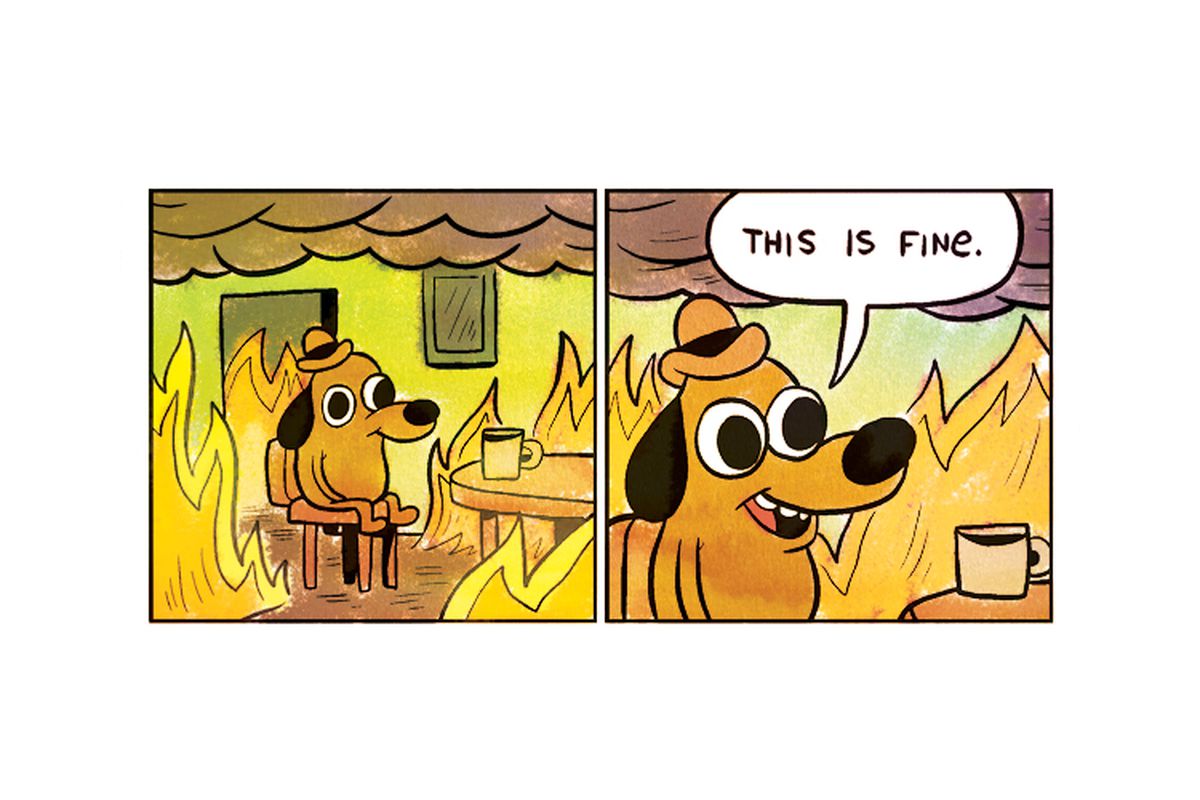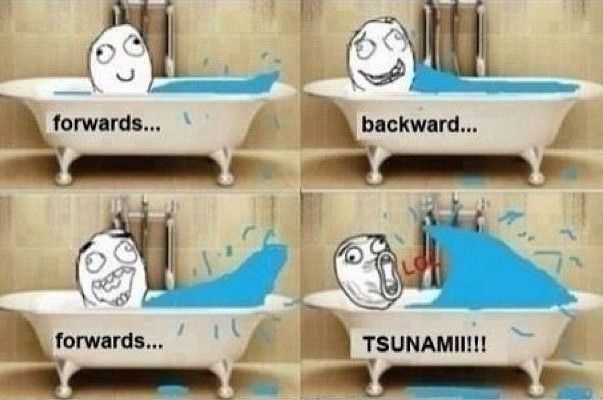Tsunamis, Crap Presents, and Other Things I Wish I Knew Sooner
Never put off until tomorrow what can be done the day after tomorrow - The Internet said Mark Twain

Recruiting is very much an experience based job. You can study, have second and third level degrees, and certifications out the yin-yang, but at the end of it all you learn by what you take away from your day-to-day experiences. Generally, recruiting, as in the literal muscle - bicep pics coming soon - of picking up the phone and calling somebody, is not that difficult. What is more challenging however, is everything around that. Never mind the emotional sanity that hangs delicately in the balance and can fracture in a mere moment, but its the processes, stakeholder and candidate management, meetings, and persistent fire drills that have a knack of occurring at precisely the moment you're unable to address them that leave you sweating in the night haunted by all the things you forgot to do as you drift restlessly to sleep only to wake up and experience it all again.

Ok I'm a bit dramatic, but if you're a recruiter reading this, you have to admit sometimes your life is very much like this meme and its just part of #howitis. There are a few things that help provide sanity in the never ending world of recruiting, and all of them come back to having a solid process and a solid foundation. Something that is predictable and expected. As I think about how to find the predictable and expected, I keep coming back to 3 areas that I wish I knew sooner.
- Manage your time
- Be lazy
- ATD - Attention to Detail!
Managing your time
The key to time management is strict adherence to a ridged schedule, while remaining flexible enough to let anything happen at any time. - unknown
Over the past few years, I've very much settled on the notion that your output is completely determined by your input. You have to know exactly how much effort you need to put in to get the results you want, and this really requires you to closely manage your time. I've heard a lot of different approaches to this and you'll hear people swear that theirs is the "only key to success", but really I think you have to do what works for you. You should take bits and pieces of different processes and stitch them together to create your own art that speaks to who you are as a recruiter.
One process that I have stuck to is something I learned early on in my staffing days. Staffing is a whole other animal, but the people will really teach you a lot if you'll let them. To better explain this, I'd like to introduce you to Al. Al is a brilliant recruiter and one of the best mentors I could have had. Al was like a sniper; I swear for every two candidates he worked with one of them would get an offer and man, he could sell anything – even a ketchup popsicle to woman wearing white gloves, but I digress. After a few months of serving up some steaming-hot-crap-on-a-platter I knew I needed more advise. It was Al's advise that has made one of the largest impacts in my career thus far. See, Al had this analogy – you have to think about recruiting as a Tsunami. Think about the energy, think about all the plates shifting against each other and building a wave. The more energy there is, the bigger that wave gets. After a fashion, the wave has to move forward and eventually gravity has to bring that wave crashing down; thats the key part IT HAS TO. You have to trust that after all the energy you put into building your candidate pipeline that it has to come crashing down, and when it does, you will get hires.

I'm not trying to make light of Tsunami's by any means, but I think the analogy makes perfect sense. My entire recruiting process is built around this. I firmly believe that if I put enough energy into sourcing and screening the right candidates that I will always hit my goal – I have to. I've put the energy in and now gravity will do its thing.
On top of this analogy, Al also shared some ideas around benchmarks. You shouldn't build this wave for the sake of doing it. You should do it with a purpose and with a milestone in mind. You should find a spot where you look at the candidates you have interviewing and be able to say – "yes, I'm going to get 1, 2, 3+ hires out of this". If you can find that spot then you're golden. For me, that number is 10. I know for a fact, every single time, if I can get 10 people onsite then I am going to get at least 2 offers out of that group and hopefully 2 hires. I would encourage every recruiter to think about this. Find the expected in all the chaos. Find your number or your milestone. Find a point where you can more accurately than not predict your outcome. Find the predictable and expected. Make your energy purposeful and you will watch your success and your "luck" grow rapidly.
Be Lazy
You're only as good as your last hire - My dad says this, but I'm sure he got it from somewhere else
As mentioned a moment ago, its important be purposeful. Recruiting is chaotic and unpredictable enough without walking into it without a plan of attack. For me, that plan is to do no more than necessary to achieve what I set out to do for the quarter. Now hear me out, this doesn't mean you don't push yourself, stretch yourself, take pride in the work that you're doing. But, what this does mean is don't overdo it. Nobody is impressed with you if you can't deliver. No amount of metrics or talking about how busy you are is going to fool anybody who is paying attention. Strip all of that away and where do you end up?
The reality of recruiting, at any level, is you're only as good as your last hire. Sorry folks, thats it – no hire-y; no like-y. So, what that means is you need to be selfish, and yes, to some extent, be lazy. First of all, grab the low hanging fruit. No, you're not too good to fill the entry-level role or the easiest role on your plate. Just take the dang req, fill it, and move on. You are doing yourself a huge disservice by thinking people are impressed by you for only working on the hard stuff. If you want to live and learn the hard way do what I did. Go into staffing, pick the hardest reqs you can, never fill them, and literally live off of dinner dates, ramen, and left over beer that your friends brought over for your most recent pre-game. Guess what? I was broke, miserable, and left the agency life in less than a year, and worse nobody was impressed by me. To counter this point, you should also work on the hard stuff. You're going to have to, but it doesn't mean you can't be specific and purposeful. Know your strengths and use those to fill positions you know you can fill, and remember the Tsunami analogy.
Own your time. Regardless of how many positions are assigned to you, you have to know how to own your time. Not every position is the same. There are some that you have to work on for 3x longer than you wish you did and others that will fill in less than a month. Plan for that. Don't set arbitrary metrics or goals for yourself. Know what works. Or if you don't know, start figuring it out.
Attention to Detail
ABC requires ATD - To always be closing you have to have attention to details
Recently, my manager mentioned that I have great attention to detail. It was everything I could do not to burst out laughing in her face, but after a moment of letting that digest I had to admit, its not bad. I am not perfect. I still miss a lot of things here and there, and thats OK – I'm sure nothing is more exciting to our Ops team than having to fill in the USD pay type for offers when I forgot to assign that in my offer requests.– But, what I have learned is that you can't miss the big stuff. For this example I have to again go back to my staffing days – can you tell yet that I learned a lot there? I'm OK admitting I was not much of an agency recruiter, but that was at the time entirely of my own doing. It wasn't that I couldn't do it, it was that I missed the big stuff... constantly. I was literally my own worst enemy. What I was very good at doing however was presenting information as though I had everything perfectly wrapped up. It was neat and tidy and seemed to address all the necessities. There is a part of me that is proud of my ability to fake it until I make it, but I quickly realized that your job is not a place where that skill is particularly rewarding.
My manager, Mike was pretty instrumental in getting me to realize that my attention to detail was completely misplaced. I was so focused on not letting anybody down that I ended up always letting people down. One of my very first mistakes was so simple, but it still haunts me 5 years later - I messed up a phone number. I worked so hard to find a great candidate for this really challenging security engineer opening at a new client and I gave our client the wrong phone number for the phone interview. The hiring manager called, didn't get the candidate, the candidate got irritated and never got back to me to reschedule, and I watched my unicorn flit back into the woods never to be heard from again. I get that this happens, this is minor (although, stake your compensation on it and I bet its not minor anymore), but it was my first eye-opening experience of how important attention to the right details (and "copy/paste") really is. Fast forward a few months, and a lot more mistakes Mike asked for a one-on-one to talk about, you guessed it, my attention to detail.
For those who don't know me, I HATE letting people down. It actually crushes me and makes me anxious, so imagine how literally sweaty I was walking into a one-on-one where I knew I was in trouble. Frankly, I thought I was getting fired, but instead I got the second best advise of my career - don't give anybody a crap present.

Mike, and the afore mentioned Al, sat across from me at this absurdly large conference room table. I walked in with my notebook in hand - another piece of sage advise by the way, go nowhere without a notebook - and sat down. Mike looked at me and said (I paraphrase), "Emily, what is going on with you? You seem like everything is together, but yet time and time again some detail is constantly missing". He continued, "its like you've given me a gift. Here it is all neatly wrapped up. Its got this really great bow and I'm pretty excited to open it, except when I do, its always a pile of crap inside. Do you realize how disappointing it is to get a crap present?" The conversation went on and there are few other things we chatted about, but nothing stood out to me more than the crap present. How awful is that? I was performing the ding-dong-ditch of recruiting! Anyway, after that conversation I knew I had to get better, and I did, but it took a long time.
Attention to detail does not come right away, but the best place to start is to be honest. As I've thought about it, lack of attention to detail leads to dishonesty because then you have something to cover up, to lie about, to make seem OK. You end up lying to yourself, your manager, your stakeholders, your co-workers, and your candidates. Just be honest. Just make that a priority in your work every day and your attention to detail will get better. Be honest when you miss something; go get it. Be honest when you mess up; go fix it. I bet you'll get sick of double working and eventually you'll just do it right the first time.
While my crap present advise is crass it does work, but for the more polite version I have to refer to a recent conversation I've had: Attention to detail is the small thing that takes a good recruiter to great. You can get away with never being great, but if you want more, you have to have attention to detail.
So, in summary, there you have it. Solid foundation, solid process, solid basics. Thats it. That is all you need to be good at the muscle of recruiting. If I could start again, knowing what I know now, I would probably have been more successful faster, but thats just it, you can't. But recruiting is just that – its the epitome of living and learning by experience and hoping one day somebody will read a random blog post and say - "wow, what great advise" and live happily ever after.
Thanks for reading my post! Comments and topic ideas are always appreciated.